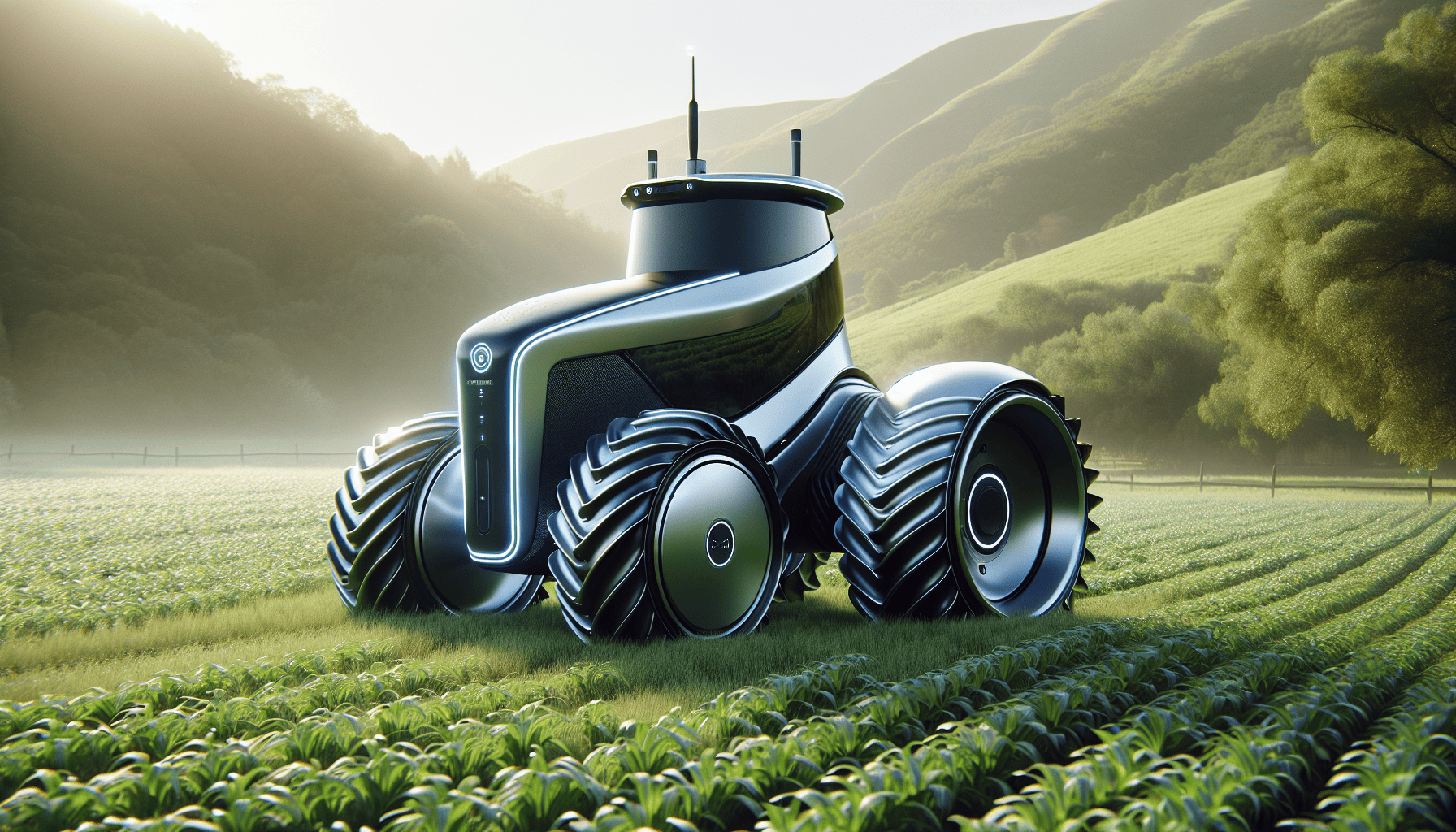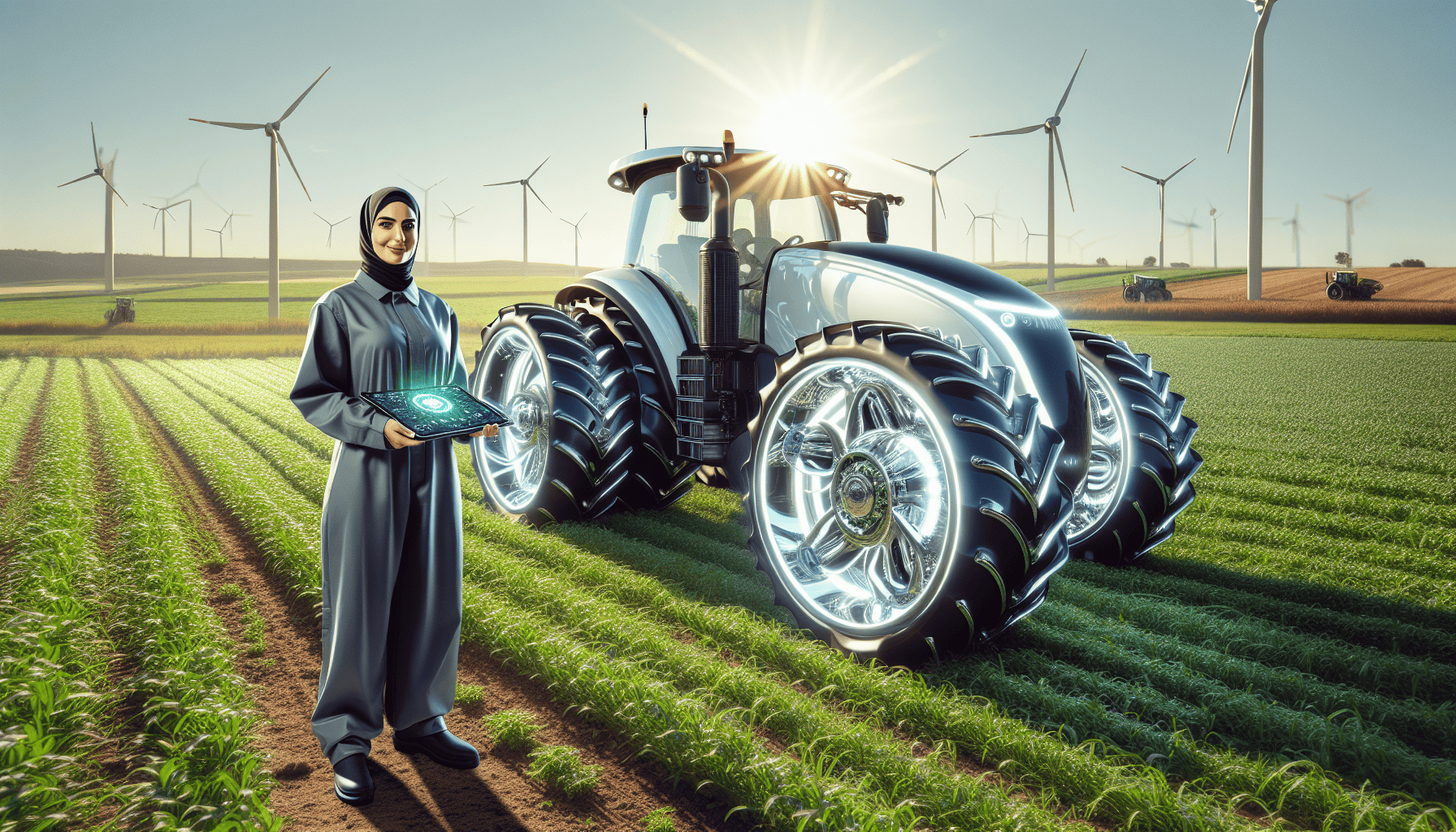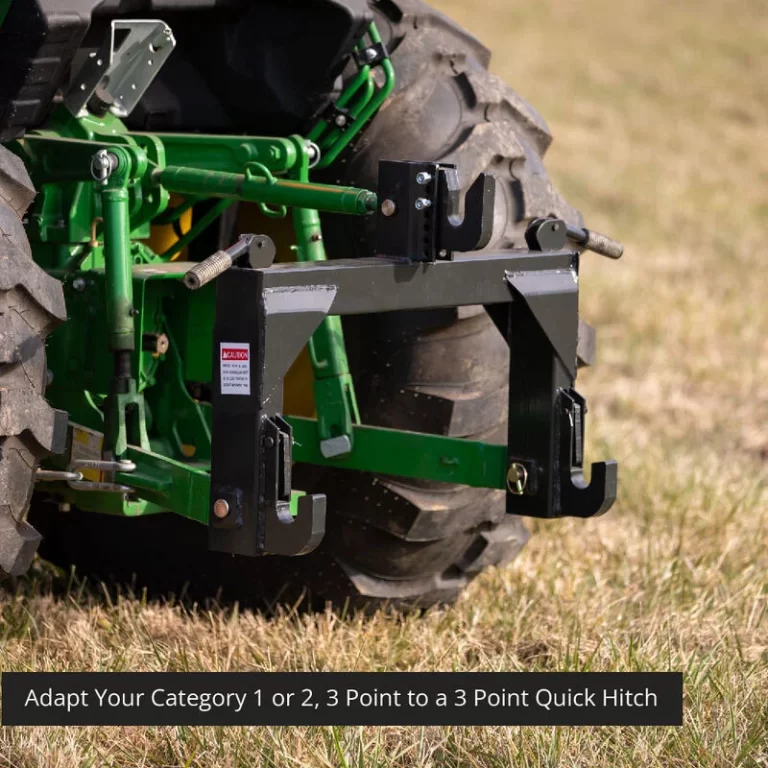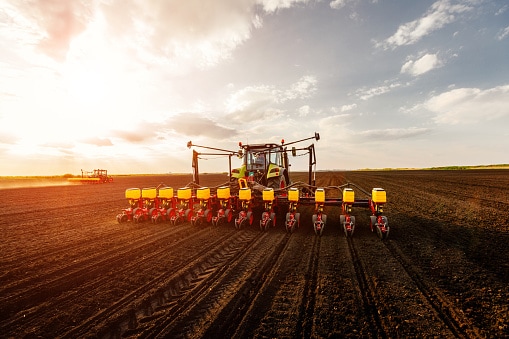Revolutionizing Farms: How Electric Tractors Are Paving the Way for Sustainable Agriculture
Electric tractors are driving the transition to more sustainable farming practices. These vehicles don’t produce fumes and smoke like traditional models, but rather operate silently on clean energy. This is no longer a vision of the future. It’s happening now! By exploring electric tractor technology and its advantages and drawbacks, we can see how they are playing an important role in making agriculture greener for us all.
Key Takeaways
Electric tractors are transforming traditional diesel-powered farming, reducing environmental impact and providing cost-effective power outputs.
Innovations in electric tractor technology have led to the development of more powerful and efficient models, with various financial incentives making them a wise investment.
Electric tractors provide numerous benefits for sustainable agriculture such as zero emissions, energy efficiency and minimal soil disturbance.
Harnessing the Power of Electric Motors in Agriculture

Electric tractors are challenging the long-standing primacy of diesel engines which have been powering farming operations for years. Equipped with electric motors and batteries, these machines act as a much more environmentally friendly alternative to conventional models powered by fuel. As well as reducing environmental impact, such vehicles may also lower costs significantly in fruit and vegetable production due to their need for fewer resources like oil or DEF alongside maintenance fees. The power capabilities that come from electric motor technology can be seen through developments such as e25 Gear’s Front Loader tractor or Solectrac’s vineyard equipment. Demonstrating they have the potential to meet most farm duties proficiently while providing value savings at every level within agricultural workflows.
The Mechanism Behind Electric Tractors
Electric tractors are powered by an electric motor that is able to generate mechanical force through the use of electromagnetic fields and magnets. All-electric models can be plugged into either standard outlets or renewable energy sources like solar, offering greater flexibility with regards to their operation. These vehicles have a long lifespan thanks mainly to their durable lithium ion battery which has around 10 years life expectancy depending on how often it’s used and discharged. Electric tractors prove more sustainable than fossil fuel driven machines as they do not deplete finite resources nor contribute greatly towards environmental pollution when compared side by side.
The Environmental Edge: Zero Emissions and Lower Carbon Footprint
The Monarch tractor is one of the leading electric tractors that promote eco-friendly technology. Its zero direct emissions during use greatly reduces air pollution and greenhouse gases, while its minimal maintenance contributes to a much lower carbon footprint than diesel powered tractors have. The latter are associated with numerous pollutants which can lead to adverse effects such as increased lung cancer risk, acid deposition in areas nearby or harm vegetation due to ground ozone production. This makes it clear why farmers must switch towards using electric models like the Monarch for their operations rather than just rely on diesel ones if they want to help maintain sustainable agriculture practices. Through reducing up to 87% operational emissions compared to those from regular engine run machines, these handy vehicles grant an even greater incentive when looking at maintaining cleanliness and taking care of our planet’s wellbeing overall!
Monarch MK V: A Leader in Smart Tractor Technology

Monarch Tractor has made a big entrance into the electric tractors industry with its flagship model, Monarch MK V. This innovative driver-optional smart tractor not only replaces diesel engines with fully electric motors, but also utilizes autonomous operation and enhanced precision farming capabilities for maximum efficiency and sustainability. The joint effort between Monarch Tractor and CNH Industrial highlights their dedication to advancing these features in this type of tractors. It delivers up to 70 horsepower at peak levels while supplying 40HP of continuous power as well as offering remarkable torque outputs.
The advantages that stem from using such an advanced technology include reducing manual labor needs, eradicating emissions produced by conventional fuel sources, and cutting herbicide usage down significantly. Thus promoting safer working environment alongside sustainable agriculture practices for a brighter future ahead.
Maximizing Efficiency with Autonomous Tractor Features
The Monarch MK V is an advanced farming solution, offering the power of technology to assist farmers with their operations. This tractor features autonomous operation capabilities which utilize cutting-edge vision, GPS and AI technologies that eliminate the need for manual labor, ultimately saving on costs. Its cellular network connection along with a multitude of sensors grants remote diagnostics and rapid issue resolution in order to prevent downtime. With these sophisticated systems incorporated into its design, this powerful tool allows modern agriculturalists to take advantage of breakthroughs within agriculture industry through improved efficiency as well as productivity.
Integrating Advanced Tech for Precision Farming
The Monarch MK V is a powerful piece of farming equipment that serves as the driving force in ushering an era of agricultural progress. This tractor, fitted with cutting-edge technology and capabilities such as human detection, collision prevention and intelligent agriculture, enables farmers to work more precisely than ever before.
Thanks to its diverse features like seed planting capability, reaping crops for harvest, and tilling soil preparation. Pesticide or fertilizer spraying actions along with hauling heavy loads & operating various implements has become an integral part of sustainable farming practices today. The unique characteristics offered by this particular monarch mk v make it the ideal choice when looking for reliable farm machinery ready to tackle production processes from start till finish without fail!
This modernized approach towards agriculture – which through efficient utilization via precision engineering technologies promises increased outputs coupled with conservation methods – makes having the right kind of equipment absolutely essential thereby giving tractors like Monarch Mk V their undeniable importance on any given day within all sectors related directly or indirectly to agriculture at large making them invaluable investments going forward into times ahead.
The Financial Implications of Switching to Electric

Electric tractors come with the evident environmental advantage but also have economic significance. Depending on features, they may cost more than regular models initially, yet are cheaper to operate and maintain over time due to lower fuel costs. This could make electric tractor a wise investment in the long-term for farmers who explore incentives like subsidies or tax credits which can reduce their initial price up to 65%, sometimes even as high as $30,000 depending on model selection. Maintenance requirements of these vehicles will be lower when compared to conventional tractors. Taken together, this makes them financially viable options that many farmers should consider seriously!
Breaking Down the Base Price and Maintenance Costs
At first glance, the Monarch electric tractor may appear more expensive than its diesel equivalent. Considering that operating and maintenance costs are substantially lower for an electric model due to their fewer moving parts necessitating less repairs – which can be as much 23% cheaper over 3 years – it is easy to see how purchasing such a vehicle would constitute a sound investment in the future. What’s more, switching from diesel fuel with zero cost means owners of these tractors save on additional energy expenses given electricity prices tend to work out at a bargain rate when compared with those of traditional fuels. Taking into account both servicing charges and lowered fuel bills could soon counteract any increased upfront expenditure associated with owning an electric tractor.
Incentives and Savings: Making the Economic Case
For farmers considering shifting to electric tractors, there are financial incentives such as grants and tax credits that could help offset the higher upfront cost. Over a longer period of time, they can provide substantial savings due to their lower fuel and maintenance costs – saving up to $12 000 in labor alone each year when run autonomously. Implementing this technology into farming operations would not only benefit financially but also enable more sustainable agricultural practices by decreasing emissions from use of combustible fuels.
The Future is Electric: Emerging Trends in Tractor Electrification

Electric tractor technology is poised for a bright future, with advances in efficiency and effectiveness that are leading to greener farming operations. These modern electric tractors can drastically reduce carbon emissions while also increasing productivity within the agricultural field. It is clear then that going forward these machines will be instrumental in paving the way towards smartly run sustainable farms of the near future by providing an ideal platform on which innovative implements may operate.
Innovations Leading to More Powerful and Efficient Models
Electric tractors have been revolutionized through innovations that enable increased power and efficiency. Features such as precision agriculture, automation/robotics, electrification, and improved tractor attachments are now being included in electric tractors to provide farmers with the latest advances in technology. Sensory cameras for autonomous operation plus telematics monitoring performance come combined with digital interfaces on modern modular designs allowing room for Upgrades down the line.
In order to make it easier for farming communities everywhere to access state-of-the-art agricultural tech solutions based off this trend of advancement surrounding electric machines like Monarch Tractor’s products. Other manufacturers can enter into an agreement known as technology licensing where they would be able to utilize each others resources while still remaining independent businesses at their core despite working towards a common goal, helping progressions within efficient operational methods and electrical technologies emerge throughout various industry sectors catered toward agribusiness practices around the world today.
The Role of Electric Tractors in Sustainable Farming Practices
Electric tractors are increasingly becoming part of sustainable farming practices. These vehicles not only reduce carbon emissions and improve energy efficiency, but also help maintain the soil’s health by fighting against erosion, releasing zero-emission output while causing minimal disruption in the surroundings. In this way they contribute to a more eco-friendly environment for agriculture activities with positive impacts on biodiversity as well due to their decreased pollutants and noise pollution. Not only do electric tractors provide environmental benefits, but farm life itself is enhanced thanks to them fostering an ecosystem conducive to biodiversity preservation.
Real-World Performance: Electric Tractors in Action

Electric tractors are proving themselves to be beneficial and practical in a range of farming scenarios, from vineyards to dairy farms. Their advantages include environmental sustainability through reduced emissions, energy independence by using less fuel, more efficient working practices thanks to their longevity over other vehicles, as well as increased productivity when paired with precision or smart farming technology.
These advanced electric machines offer unique benefits that may transform the agricultural industry, such as optimized fertilizer use for improved efficiency and conservation resulting in decreased greenhouse gas output. Electric tractors also have an impressive level of adaptability which allows farmers higher levels of management control while maintaining high performance standards at minimal cost per acreage covered.
Due to its effective and reliable nature demonstrated so far on various farmland settings (plus the added possibility for greater connectivity between systems), it’s clear why electric tractor adoption is growing steadily amongst agriculturalists across many countries worldwide.
From Vineyards to Dairy Farms: Success Stories
Electric tractors have brought huge advantages to certain types of farming like dairy and vineyards. For these farms, electric tractors offer environmental-friendliness due to lower emissions, less air and noise pollution, and cheaper operating costs. As well as automation for a better allocation of farmers’ time.
Also, the introduction of this technology is bringing fuel savings along with more efficient operations when it comes to sustainable farming practices, which also include financial incentives promoting their use. Not only do they allow precise herbicide application but can be charged from renewable energy sources too so that overall productivity increases while operation is cleaner and quieter than ever before!
Adapting Electric Tractors to Meet Diverse Agricultural Needs
Electric tractors have many advantages that can be utilized in agriculture. They are both efficient and sustainable, conserving fuel while emitting no carbon emissions during operation. They offer superior performance over diverse farm environments with their specialized implements for wet conditions or steep slopes of expansive fields. Family farms located in emerging areas benefit from the quieter performance these models provide as well as adaptations including precision agriculture technology and autonomous abilities to complete numerous farming tasks quickly and accurately. All this makes electric tractors a versatile tool for grain production, livestock management, horticulture operations – or any other purpose needed on the farm itself!
Navigating Challenges and Limitations
Electric tractors like the John Deere GridCON and Fendt e100 Vario, along with other models from the company boast power output up to 400 horsepower similar to traditional diesel engines. Despite these advancements in electric technology, challenges remain concerning energy capacity of batteries and requirements for farming operations that limit tractor running time on a single charge. Electric tractors are showing themselves able to compete as viable alternatives when it comes down to efficient agricultural production.
Overcoming Battery and Charging Hurdles
Electric tractors are gaining ground as an increasingly viable option, but there are certain hurdles in terms of battery longevity and charging duration which must be addressed. Companies have come up with a range of solutions to deal with these issues. Energy management systems, regulating the speed at which batteries charge, and regular maintenance are among them. Typically electric tractor chargers take several hours before a full power boost can be achieved – usually overnight – though more advanced rapid systems that achieve 50% capacity within five minutes or 100% after 10 mins have been developed for this purpose too.
For Acceleration in adoption rates, it is important to build reliable infrastructure capable of meeting current electrical needs via efficient outlets/charging stations aligned with J-1772 standards so they may cater specifically for electrically powered agricultural vehicles without any delays.
Comparing Power Output with Traditional Tractors
Electric tractors can match the power output of conventional diesel models, proving their capability to handle a wide range of farming operations in the same manner. Even more strenuous tasks such as plowing, tilling and transporting large volumes are within reach for some electric tractor designs. Despite any difficulties related to battery life, it is clear that these vehicles provide similar performance levels to that expected from standard tractors when it comes to both strength and capacity.
Which trucking companies are transitioning to electric tractors
As electric tractors become increasingly accessible and infrastructure for charging them continues to develop, leading trucking companies such as Navistar, Schneider National, Daimler Truck AG (Freightliner), Nikola Motors Volvo, Tesla BYD Kenworth Peterbilt are transitioning their fleets in order to reduce emissions and benefit from the economic incentives provided by supportive policy measures.
Summary
The use of electric tractors is increasingly revolutionizing agriculture, and will likely be an integral part of sustainable farming in the future. Their environmental benefits, lower cost compared to traditional models, advanced features and versatility make them a desirable choice for farmers looking to innovate with new technologies. Despite challenges along the way that must still be addressed through continuous innovations aimed at improving performance and efficiency. As more producers embrace these tractors, they can become key players in reshaping agricultural practices for all forms of betterment going forward.
Frequently Asked Questions
What are the most popular electric tractors?
Some of the most popular electric tractors currently on the market include the Monarch MK V, the John Deere GridCON, and the Fendt e100 Vario. These models are known for their advanced features, zero-emission operation, and the ability to perform a wide range of farming tasks efficiently and sustainably.
Is there a fully electric tractor?
The Farmall Electric Tractor is a truly electric machine with 74 HP for continuous performance, four-wheel driving capability and maximum speed reaching 25 MPH. It’s the ideal choice for those looking for an all-electric tractor solution.
Are Electric Tractors Worth it on Small Farms?
Electric tractors can certainly be a valuable investment for small farms. Despite their higher upfront cost, the long-term savings in fuel and maintenance can make them a financially sound choice. They are also quieter and more environmentally friendly than their diesel counterparts, which can be a significant advantage for small-scale farming operations. Furthermore, many electric tractors are equipped with advanced features like autonomous operation and precision farming capabilities, which can help small farms to increase their efficiency and productivity. Therefore, while the initial investment might be higher, the potential benefits make electric tractors a worthy consideration for small farms.
Is John Deere working on electric tractors?
John Deere has designed electric tractors for each product family and committed to making an electrified version available by 2026. Already, a concept model of the tractor is developed for every category.
What is the battery life of an electric tractor?
The amount of time an electric tractor can go for on a single battery charge is dependant upon the model and usage, ranging from 3 to 14 hours. Factors such as type of electrical vehicle or how it is used determine the life span one has.
What are the environmental benefits of electric tractors?
Electric tractors have a decreased carbon footprint and no emissions, making them an ideal choice for farming that seeks to be more environmentally friendly than traditional tractor operations. This benefit of electric vehicles can lead to improved sustainability as they produce less pollution compared with the typical engines found in other types of tractors.
How does the Monarch MK V enhance farming operations?
The Monarch MK V offers advantages to farming operations with its intelligent features and accuracy for crop cultivation, leading to improved productivity while decreasing operational expenses. This powerful tool allows farmers to optimize their yield without compromising on quality or cost of labor.



